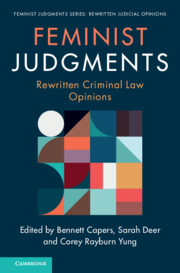Book contents
- Feminist Judgments: Rewritten Criminal Law Opinions
- Feminist Judgments Series
- Advisory Panel for Feminist Judgments Series
- Feminist Judgments: Rewritten Criminal Law Opinions
- Copyright page
- Contents
- Advisory Panel for Feminist Judgments: Rewritten Criminal Law Opinions
- Notes on Contributors
- Introduction and Overview
- Part I Gendered Justice
- 1 Commentary on McQuirter v. State
- 2 Commentary on People v. Berry
- 3 Commentary on Coker v. Georgia
- 4 Commentary on Oliphant v. Suquamish Indian Tribe
- 5 Commentary on State v. Rusk
- 6 Commentary on People v. Wu
- 7 Commentary on Winnebago Tribe of Nebraska v. Bigfire
- 8 Commentary on Commonwealth v. Blache
- Part II Gender on Trial
4 - Commentary on Oliphant v. Suquamish Indian Tribe
from Part I - Gendered Justice
Published online by Cambridge University Press: 01 December 2022
- Feminist Judgments: Rewritten Criminal Law Opinions
- Feminist Judgments Series
- Advisory Panel for Feminist Judgments Series
- Feminist Judgments: Rewritten Criminal Law Opinions
- Copyright page
- Contents
- Advisory Panel for Feminist Judgments: Rewritten Criminal Law Opinions
- Notes on Contributors
- Introduction and Overview
- Part I Gendered Justice
- 1 Commentary on McQuirter v. State
- 2 Commentary on People v. Berry
- 3 Commentary on Coker v. Georgia
- 4 Commentary on Oliphant v. Suquamish Indian Tribe
- 5 Commentary on State v. Rusk
- 6 Commentary on People v. Wu
- 7 Commentary on Winnebago Tribe of Nebraska v. Bigfire
- 8 Commentary on Commonwealth v. Blache
- Part II Gender on Trial
Summary
The Supreme Court issued a plurality opinion holding that Ehrlich Anthony Coker’s sentence of death for the rape of an adult woman was “grossly disproportionate and excessive punishment” in violation of the Eighth Amendment. Unlike other cases from the era, which focused on the procedures for administering capital punishment, the Court found the death penalty excessive for the crime of rape regardless of the procedures used to reach that determination. Notably, an amicus brief authored by Ruth Bader Ginsburg, outlining the feminist case against applying the death penalty in cases of rape, did not serve as the basis for the plurality’s reasoning. Instead, the Court adopted rationales that many consider to be patriarchal and patronizing toward women.
- Type
- Chapter
- Information
- Feminist Judgments: Rewritten Criminal Law Opinions , pp. 69 - 88Publisher: Cambridge University PressPrint publication year: 2022

